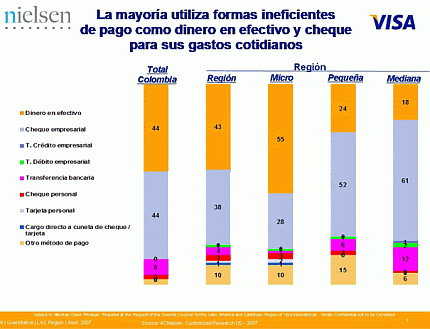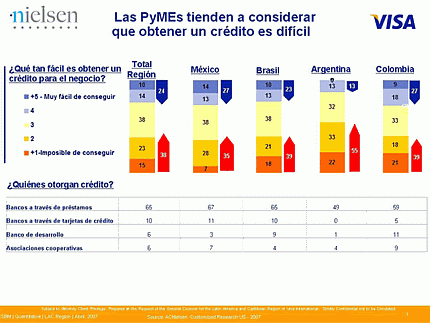|
jueves, agosto 23, 2007
La apuesta audaz de Facebook
miércoles, agosto 22, 2007
El León Chino Ruge en Línea.
INTERNET/PIB Subscribe to emarketer free newsletter. |
| JULY 26, 2007 The Chinese Tiger Roars Online One hundred and thirty-four million, and counting.
At 134 million in 2006, China already had the world's second-largest Internet population. |
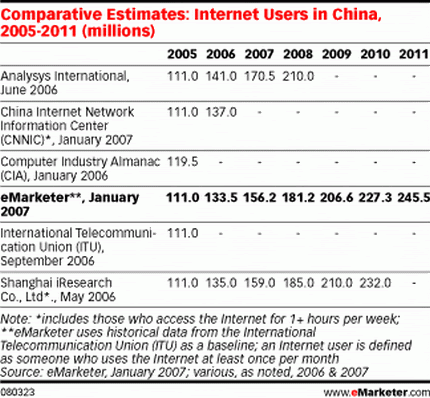 |
According to predictions in eMarketer's new report, China Online Overview, the country's online population is growing 30% a year, and will soon pass the US to have the most Internet users in the world. China also has plenty of room to grow online. Since only 10.5% of Chinese used the Internet in 2006, according to the China Internet Network Information Center (CNNIC), eMarketer expects the number of Chinese online to reach 245.5 million by 2012. Two-thirds of Chinese Internet users had broadband service in 2006. |
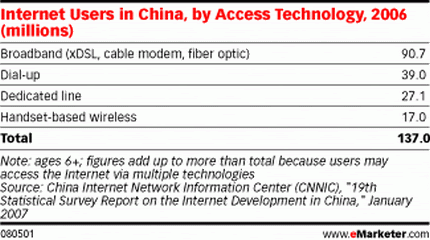 |
| With 56.3 million broadband users, according to PointTopic estimates, China is now the world's second-largest market for broadband services. The United States still led slightly in the first quarter of 2007 with 60.4 million broadband lines. |
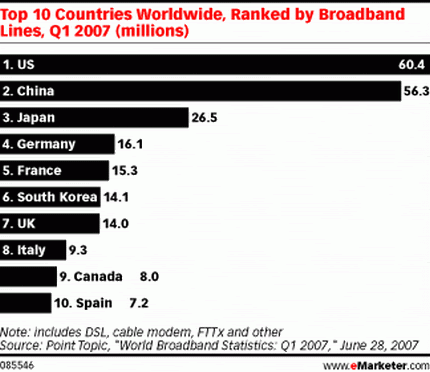 |
By 2011, eMarketer predicts China's broadband population will swell by 62%, totaling 90.5 million households. ADSL is by far the most popular broadband technology in China, with 33.9 million household subscribers and comprising 73% of the market in 2006. |
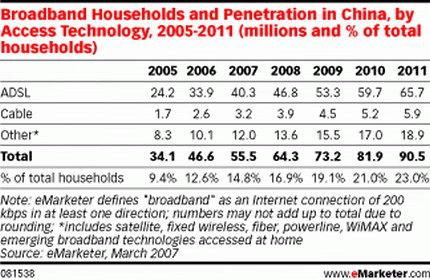 |
To explore the huge opportunities — and pitfalls — awaiting Internet marketers in China, read the new eMarketer report, China Online Overview, today. |
| ©2007 eMarketer Inc. All rights reserved |
Post Scriptum 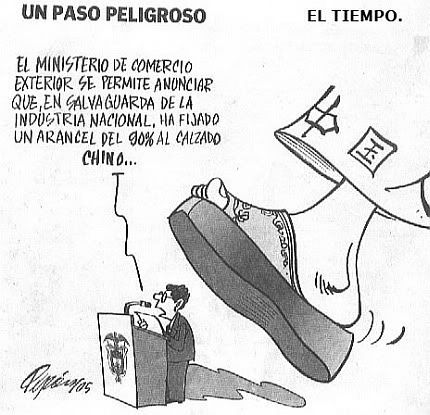 |
martes, agosto 21, 2007
Generación Facebook
|
lunes, agosto 20, 2007
Pymes consideran que el crédito es difícil de conseguir
 PYMES/CRÉDITO |
| Agosto 20 de 2007 Pymes consideran que el crédito es difícil de conseguir Una investigación sostiene que sólo el 30% de las Pyme del país cuenta con instrumentos financieros para el desarrollo de su negocio. En América Latina este indicador llega al 51%. |
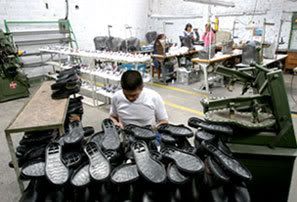 |
| Los proveedores de materia prima e inventario sirven como fuentes alternas de financiamiento para las Pymes, ya que el 67% les ofrece facilidades de pago y un 63% también les otorga descuentos por pronto pago. |
Aunque nueve de cada diez Pymes de Colombia espera y desea crecer, lo cierto es que existen barreras para el logro de este objetivo, como la falta de conocimiento sobre la existencia de soluciones de pago empresariales y la percepción general según la cual los instrumentos de crédito son difíciles de conseguir. Esta es una de las conclusiones de un estudio realizado por Visa International Región América Latina y el Caribe y Nielsen Company en 1220 Pymes situadas en ocho países de la región. Además de Colombia, se analizaron diferentes temas de las pymes en Argentina, Brasil, Chile, Costa Rica, México, Perú y República Dominicana. |
En la investigación: "Perspectivas de las Pymes en América Latina", realizada entre enero y marzo de 2007, se demuestra que sólo el 18% de los empresarios Pyme de Colombia se registran como personas jurídicas. Esta realidad no está muy lejos del resto de la región. Para gran cantidad de pequeñas empresas que se incluyeron en el análisis resulta más sencillo registrarse y operar como persona física en lugar de jurídica. Sólo la mitad de los dueños de las empresas se registran en este último segmento. Por otro lado, el 84% de los dueños de las empresas encuestadas en Colombia está bancarizado como persona. Sólo un 30% cuenta con instrumentos financieros para el desarrollo de su negocio. El 56% de los emprendedores que se tuvieron en cuenta para la investigación dijo que utiliza sus productos personales con fines empresariales. En contraste el 81% de las pymes encuestadas manifestó su interés en separar los gastos personales de los comerciales. El comportamiento para el resto de la región es similar al caso colombiano. Un 87% de los dueños de las pymes está bancarizado pero sólo un 51% cuenta con instrumentos financieros para su empresa. "Por ello es frecuente que se utilicen los productos personales con fines empresariales; hasta un 44% indica que adopta esta práctica", señala el documento. |
Acceso a crédito y otros indicadores El acceso a crédito es uno de los temas críticos para el negocio de las empresas analizadas en la investigación. Los resultados señalan que el 27% de la muestra en Colombia, percibe que es fácil acceder a alternativas de crédito y aproximadamente el 36% dijo que contaba con algún crédito formal, el cual es mayormente otorgado por los bancos. Sin embargo, los proveedores de materia prima e inventario sirven como fuentes alternas de financiamiento, ya que el 67% les ofrece facilidades de pago y un 63% también les otorga descuentos por pronto pago. El dinero en efectivo y cheques son mecanismos que el estudio considera "ineficientes" como formas de pago para sus gastos cotidianos. Sin embargo el 88% de la población objeto de análisis utiliza este medio para cancelar sus cuentas, aunque el uso de ambos varía dependiendo del tamaño de la empresa. Ninguna de las compañías encuestadas utiliza tarjetas de crédito o débito, ya sean empresariales o personales, para sus gastos diarios. En el ámbito de las demás pymes de la región analizadas, el 17% de estas manifestaron que cuentan con una tarjeta de crédito para uso exclusivo de la empresa. "La adopción de productos específicos para estas compañías es una clara necesidad que aún debe ser atendida", declara el informe. |
| Dinero.com © 2006. Todos los derechos reservados. Está prohibida la reproducción total o parcial de la página. |
En Africa, (Latinoamérica ?), la China es al mismo tiempo; beneficios y competencia.
INTERNATIONAL BUSINESS | ||
| In Africa, China Is Both Benefactor and Competitor By LYDIA POLGREEN and HOWARD W. FRENCH Published: August 20, 2007 | ||
|
| ||
| KABWE, Zambia — The courtyard in front of the Zambia China Mulungushi Textiles factory is so quiet, even at midday, that the fluttering of the ragged Chinese and Zambian flags is the only sound hanging in the air. The factory used to roar. From the day it opened more than 20 years ago, the vast compound had shuddered to the whir of rollers and the clatter of mechanical weaving machines spooling out millions of yards of brightly colored African cloth. Today only the cotton gin still runs, with the company's Chinese managers buying raw cotton for export to China's humming textile industry. Nobody can say when or even if the factory here will reopen. "We are back where we started," said Wilfred Collins Wonani, who leads the Chamber of Commerce here, sighing at the loss of one of the city's biggest employers. "Sending raw materials out, bringing cheap manufactured goods in. This isn't progress. It is colonialism." Chinese officials and their African allies like to call their growing relationship a win-win proposition — a rising tide that lifts all boats in China's ever-widening sea of influence. This year, China pledged $20 billion to finance trade and infrastructure across the continent over the next three years. In Zambia alone, China plans to invest $800 million in the next few years. From South Africa's manganese mines to Niger's uranium pits, from Sudan's oil fields to Congo's cobalt mines, China's hunger for resources has been a shot in the arm, increasing revenues and helping push some of the world's poorest countries further up the ladder of development. But China is also exporting huge volumes of finished, manufactured goods — T-shirts, flashlights, radios and socks, just to name a few — to those same countries, hampering Africa's ability to make its own products and develop healthy, diverse economies. "Most of our countries have been independent for 35 to 50 years," said Moeletsi Mbeki, a South African entrepreneur and a political analyst. "Yet they have failed to develop manufacturing for a variety of reasons, and for the Chinese that's a huge opportunity. We are a very important market for China." On the one hand, Chinese imports give Africans access to goods and amenities that developed countries take for granted but that most people here could not have dreamed of affording just a few years ago — cellular telephones, televisions, washing machines, refrigerators, computers. And cheaper prices on more basic items, like clothing, light bulbs and shoes, means people have more money in their pockets. "There is no doubt China has been good for Zambia," said Felix Mutati, Zambia's minister of finance. "Why should we have a bad attitude toward the Chinese when they are doing all the right things? They are bringing investment, world-class technology, jobs, value addition. What more can you ask for?" But across Africa, and especially in the relatively robust economies of southern Africa, there are clear winners and losers. Textile mills and other factories here in Zambia have suffered and even closed as cheap Chinese goods flood the world market, eliminating much-needed jobs in a country where less than half the adult population has formal employment. And the Chinese investment in copper mining here has left a trail of heartbreak and recrimination after one of the worst industrial accidents in Zambian history, a blast at a Chinese-owned explosives factory in Chambishi in 2005 that killed 46 people, most of them in their 20s. "Who is winning? The Chinese are, for sure," said Michael Sata, a Zambian opposition politician who campaigned in last year's presidential election on an anti-China platform. He lost, but with a surprisingly strong showing, and his party, the Patriotic Front, won many seats in local and parliamentary elections in Lusaka, the capital, and the Zambian industrial heartland, where China has made its biggest investments. "Their interest is exploiting us, just like everyone who came before," he said. "They have simply come to take the place of the West as the new colonizers of Africa." Officials at the Chinese Embassy in Lusaka did not respond to repeated requests to discuss the country's role in Zambia. But Chinese diplomats across Africa and top officials in Beijing have emphasized the money and opportunity they bring to Africa. In Zambia, for example, government officials say that the Chinese are sending dozens of workers for training in China, and that their investments will create thousands of high-wage jobs. Measured in some ways, Zambia's economy is booming. Copper prices have soared from 75 cents a pound in January 2003, to more than $3 a pound this year, driven in large part by Chinese demand. That demand has pushed Zambia's long-dormant copper mines into record production. China's Non-Ferrous Metals Corporation, a state-owned company, purchased rights to develop a mine in Chambishi, in the heart of the copper belt, in 1998, and it plans to build factories in an export processing zone that will bring as many as 60,000 jobs, according to government officials. But China's growing presence in global trade is wiping out thousands of jobs in countries with fledgling manufacturing sectors like Zambia and South Africa. Despite relatively low wages in many countries, African manufacturers find it very hard to compete, arguing that China's currency policies undervalue the yuan and give Chinese exporters a huge advantage. Many industries in China also benefited at various points from subsidies and free or low-cost government financing, making their costs lower. Beyond that, there are major infrastructure problems in Africa, where industry struggles with inadequate roads and railways, and unreliable electricity and water supplies. "So who do you blame?" said Martyn J. Davies, director of the Center for Chinese Studies at Stellenbosch University in South Africa. "You can't blame China for being too competitive. China is doing what every other emerging market is doing." | ||
| ||
|
Africa found itself once again on the losing end of globalization. If copper is Zambia's bread and butter, manufacturing should have been its main meal — just as many economies across the globe have progressed from producers of raw materials to low-tech manufacturing and beyond, a well-trod path to development. Ms. Zimba, a 40-year-old quality control worker at the plant here who asked to be identified only by her common last name because she feared losing her termination benefits, first got a job at the factory in 1989, after moving to Kabwe from the depressed eastern region of the country with her brother. She earned a little less than $100, as well as free health care and a pension, and a little three-room house in the workers' compound. But since she lost her job, her family's standard of living has plummeted. The water was turned off, and Ms. Zimba does not know where she will come up with next semester's tuition for her 20-year-old daughter's trade school. "We will see what God brings me," Ms. Zimba said. For Ms. Zimba, the transition from salaried work to selling goods for pocket change in the market is a devastating setback to a grim fate she thought she had escaped— her mother was widowed when Ms. Zimba was 15 and reduced to selling in the market as well. "I am right back where I started," Ms. Zimba said. As for the Chinese, she bitterly refers to them as "briefcase investors." "They just fill their briefcases with our wealth and leave," she said. Such anti-Chinese sentiment has been brewing here for several years. When China's president, Hu Jintao, visited Zambia earlier this year he received the usual red carpet treatment from his Zambian host, President Levy Mwanawasa , but the reception from many ordinary Zambians was nasty. A trip to the site of China's big new investment, Chambishi, had to be scuttled entirely because of fears of unrest, and the circumstances of the industrial disaster there are still not entirely understood. The mine at Chambishi had for decades been run by the government, and had limped along while copper prices slumped in the 1980s. When the Non-Ferrous Metal Mining Group bought the rights to develop the mine in 1998, local residents cheered, hoping for new jobs. In 2003, Keegan Chibuye got one as a mechanic at the mine, a job he was grateful to have in a country where even skilled men like himself struggled to find work. Mr. Chibuye's sister, 27-year-old Vennie, also found work under the Chinese, as a computer specialist at an explosives factory on the mine's grounds. Ms. Chibuye was the eldest of seven, and her parents had sent her to Britain at great expense, to a technical college in Darbyshire, where she earned a diploma in information technology. Another brother, Mwape, got a job as a casual worker in the explosives factory, for a little more than a dollar a day, to save money for college. Keegan Chibuye said he had concerns about the way the Chinese managers were running the mine almost from the beginning. "They were careless," he said. "Safety was not their priority. Everything was about productivity no matter what." On April 20, 2005, Keegan Chibuye heard an ear-splitting boom that would shatter his world — a huge blast at the explosives factory. There was almost nothing left of Vennie and Mwape left to bury. Virtually all the bodies had been incinerated. Only fragments were buried just off the main road at the graveyard built by the Chinese owners — a finger, an ear, a bit of scalp. As the 46 headstones testify, most of the workers were young, born after 1980. Officials of the company that runs the mine did not respond to repeated telephone requests for an interview to talk about working conditions and safety at the mine. But at the Chinese workers' compound in Chambishi, Han Yaping, who identified himself as the company's human resources manager, said that the company hoped to help Zambia develop. "China works here in cooperation with Zambia," Mr. Han said in English. "It is friendship." Asked why the wages at the mine were lower than those paid by other companies, Mr. Han said that Zambian workers had limited skills and no experience with technology. By way of example, he said, a Chinese worker trying to remove a screw would use a screwdriver. "But a Zambian worker," he continued with a chuckle, "he use his finger." A look around the compound for Chinese workers illustrates why China is able to do business so profitably in Africa. While Western companies must provide relatively plush and private accommodations to attract expatriate workers, the Chinese employees at Chambishi live in barracks-like conditions, several to a room. A table for table tennis and a dusty soccer field are the only recreational facilities. "We like simple," Mr. Han explained. Many African scholars and political leaders say Africa has no need for the colonial baggage and paternalism of the West, and they welcome the Chinese approach of cowboy capitalism. "Let the Chinese come," said Mahamat Hassan Abakar, lawyer in Chad, a former French colony in central Africa with deepening ties to China. "What Africa needs is investment. It needs partners. All of these years we have been tied to France. Look what it has brought us." In South Africa, dozens of clothing and textile companies closed, according to trade organizations representing manufacturers. Tens of thousands of jobs were lost because of Chinese imports, and in response the government negotiated temporary voluntary restraints on some items. But Iqbal Meer-Sharma, deputy director of South Africa's Department of Trade and Industry, said that the clothing industry was ultimately less valuable to South Africa than the other benefits of its growing relationship with China. "We've always known we have a dysfunctional relationship with the West," Mr. Sharma said. "Now with China we have a relationship as equals. They don't look down on us. They are not condescending." In an era of ruthless global competition, Mr. Sharma said, Africa should stop trying to compete with China at what it does best — producing cheap goods for export — and find other ways to compete instead. But in the meantime, many Africans are caught in limbo. Clarissa Fabrik, 19, lives at the edge of Atlantis, a depressed industrial town in South Africa's Western Cape. She had hoped to earn an engineering degree, courtesy of the scholarship fund from her mother's clothing worker's union benefit package. But her mother's factory closed, and now she is trying to teach herself basics from a textbook on industrial electronics when she is not at her retail job. "I don't know what the future will bring," she said. | ||



